This article was originally published on my website on 10th May 2020. I have updated some of the figures here (eg the number of completed events has now doubled to 18) to reflect our achievements to date.
Lockdown. Many of us are spending 23 hours a day at home. We're all looking for ways to break the monotony. But somehow the pile of unfinished or unstarted projects seems no more appealing than it did 13 weeks ago...
Back in April, I agreed to help my friend and Ladies Of Code (LoC) London co-organiser, Sarah, set up her personal blog site. By that stage, only a couple of tech communities had taken their meetups online. We at LoC London were trying to figure out if and how to move to virtual events, both in terms of content and tooling. And then it hit me...
Why not spend a Saturday afternoon doing our coding projects and invite LoC members to join us remotely? I was convinced that procrastination and lack of motivation were rife, whether or not people admitted it. I was also of the firm belief that vocalising your goals meant you were more likely to try and achieve them.
And so, Get On With It! Bring Your Own Project was born. My inspiration for the name came from our other series: Get Heard for public speaking upskilling and Get Into... for tech roles under the spotlight.
We figured that if nobody else turned up, we'd lost nothing except £15 on a Zoom subscription as we were going to work on our own projects anyway.
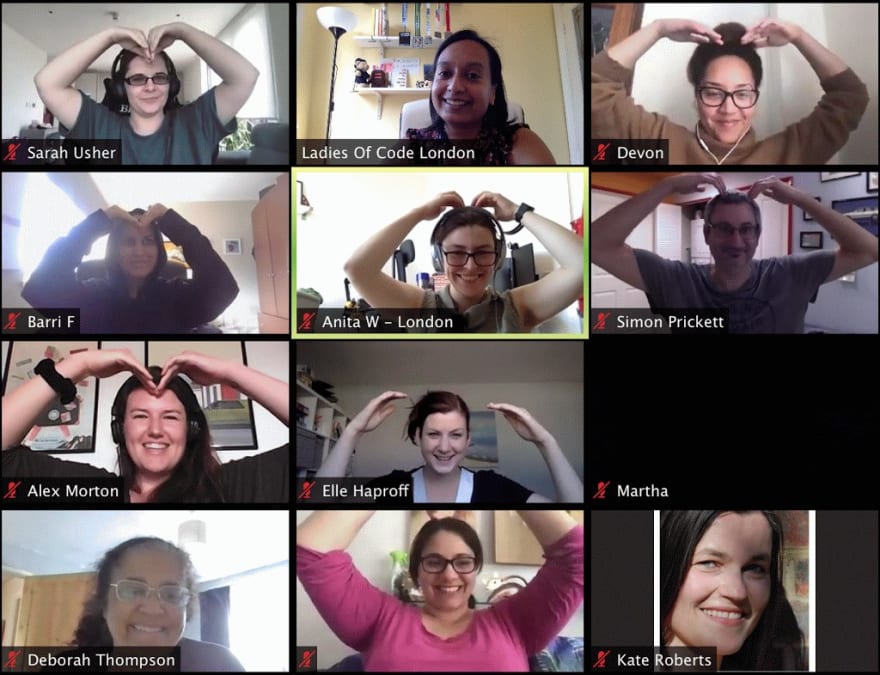

 Ladies Of Code London@ladiesofcodeldn
Ladies Of Code London@ladiesofcodeldn We're back for another @ladiesofcodeLDN #LoCGetOnWithIt! Today's pose is the #Mobot 🤩 quite apt as it was meant to be the @LondonMarathon today.
We're back for another @ladiesofcodeLDN #LoCGetOnWithIt! Today's pose is the #Mobot 🤩 quite apt as it was meant to be the @LondonMarathon today.
@SuzeShardlow on key press so no #mobot from her 😀
@ladiesofcode #womeninstem #womenintech #womenwhocode #supportnetwork @Mo_Farah15:35 PM - 26 Apr 2020
Methodology
We run Ladies Of Code London on a completely voluntary basis and work hard to create and deliver innovative events for our members. If you would like to run your own GOWI-inspired event using our ideas or parts of our format, please ensure you include proper attribution in your promotional material, including a link to my original blog post to make it clear where the ideas originated.
In my mind, for Get On With It (GOWI) to be successful, there were a few essential ingredients:
1. Careful choice of language.
I have heard a lot of talk over the past 13 weeks about how:
"When you go for a job in the future, employers are going to ask how you spent lockdown and you need to have a good answer that involves learning and personal development."
"You have more free time than ever before. You have no excuse not to learn that new skill/finish those projects/get fit..."
Not everyone has more time on their hands now. Many folks with caring responsibilities are getting zero respite. Some are having to manage this alongside full-time jobs. To endeavour not to alienate people, I worded the event description carefully.
We were also careful about the language we used during the events, which I will elaborate on later.
2. Progress, not perfection.
Success looks different for everyone. Therefore, it's important that everyone knows that their personal goals and achievements are valid. I knew we were going to hear a lot of "it's not much" so I came to the first session armed with the mantra "progress, not perfection". I just want everyone to leave Get On With It a little further forward than they were when they came.
3. Optional (but highly encouraged) switching-on of cameras and mics.
To get the most out of coming together, we need to discuss things. I believed that most people who were shy or introverted may well feel brave enough to speak up after others had shared.
4. An opportunity to state your objective(s) for the session.
Once you've voiced your intentions to the universe, they're out there and you can't take them back! That's not to say you're committed and need to beat yourself up if you don't achieve them. But there's something about hearing them in your own voice which cements them.
I was careful not to use the word "accountability" because that implies an element of compulsion. We didn't want people to feel like they were going to be held to what they said they wanted to do. Especially with coding, where you could easily spend half a day trying to fix one bug.
However, some members were pleased to have what they called "accountability" and that was fine with us. If it worked for them, we were happy but we weren't going to dictate that.
5. Breaks.
Working continuously for too long can be counterproductive so we made sure to build breaks into the schedule.
6. Opportunities to check in and celebrate.
This goes hand-in-hand with stating your intentions. The aim of the session is to get things done, so we needed to be able to come together and cheerlead and pat each other on the back.
Our weekend sessions are four hours long. Minus the half-hour break, 70% of the time is allocated to work and 30% is for checking in: what I term "showing and telling or watching and listening".
Our weekday sessions are three hours long, starting at 6pm after work. Not counting the 15-minute break, almost 60% of the time is allocated to work and the rest for checking in.
7. Ways to communicate during the session: synchronously and asychronously.
LoC London has a Slack workspace. It's pretty quiet with small bursts of activity and I want to increase engagement on it. Also, the whole point of coming to Get On With It is knowing that others are out there working on their projects too. So, to kill two birds with one stone, I decided that we needed a dedicated Slack channel to support these events. Slack is where people can discuss things between the scheduled check-ins and between events. This builds motivation and excitement.
Sarah and I wanted to collaborate on web development during the first session, and I had a feeling others may want to give or receive help too. So as not to compromise the security of our Zoom room, I created 10 Google Hangouts and posted the links to them in the Slack channel, along with instructions on how to "book" them. I named each Hangout after a London Tube station so people could say "I'll be in Pimlico" etc. A bit of normality in these strange times.
8. Publicising success and sharing resources.
We are also trying to increase engagement with our Twitter account, so I decided to make a thread for each event where we tweet information about what each person is working on. We don't attach names without their permission. The threads describe the type of activity and link to relevant resources, for example an online course that someone is taking.
We take a group photo at the beginning of each session (like the one in the tweet at the top of this post), which we start each new thread with.
I have created a new Slack channel, #learning_resources, where I cross-post any links shared in #get_on_with_it so they don't get lost and so other members can benefit from them. Some learning providers have been offering free or discounted courses recently.
Planning and logistics
We have always used Meetup.com for event listings and signups. The interface allows us to ask a question when people book their place. We use this to ask them to say what they'll work on, to get them thinking about it.
Each session contains four checkpoints via Zoom video conferencing:
At the very beginning: hello from the organisers, reminder of the code of conduct, explanation of how it all works, how the concept came about and optional personal statement from each participant of what we will be working on.
Just before the break: to remind people to relax for a bit and also to find out who wants to show and tell after the break.
Midway progress update: a quick, optional show and tell/watch and listen.
Final check-in: a longer show and tell. More people usually take part in this one because some folks don't like showing unfinished work at the midpoint.
As I mentioned earlier, between the checkpoints we use Slack for asynchronous comms during and between events and Hangouts to collaborate in real time.
Outcomes
We have seen a number of results, both expected and unexpected, from these sessions:
1. The first event was so successful that we've run them a minimum of once a week ever since.
We run the four-hour format every weekend and the three-hour version during the week after work. We have now completed 18 sessions in total.
2. People from other countries found our event and attend regularly.
This event has attracted the attention of a wider audience than we anticipated, with people joining from around the world despite this being an early morning weekend start for some of them!
One of the women I taught at my San Diego workshop found out about GOWI from a LinkedIn post and has joined several of our sessions. She has now run an online GOWI event in San Diego, on a weekend morning so we in London could join in. A member in San Francisco plans to follow suit. Both are using my ideas with proper attribution (see the end of this post).
We also have participants from other parts of San Diego, San Francisco, France and around the UK! We would never have met some of these folks had we not taken our events online.
3. We're cheering each other on outside the sessions too.
One member mentioned that she was preparing for a webinar talk she was giving, and a number of LoC members tuned in to see her speak.
4. We've seen hardware as well as software projects.
Projects that people have worked on include:
- Hooking up a Raspberry Pi to traffic lights/arcade buttons/buzzers
- Writing blog posts
- Improving a Python/GitHub profiles/Redis prize draw side project
- Training a machine learning system
- Learning about accessibility
- Taking beginners' JavaScript courses
- Honing JavaScript and CSS skills through practice/personal projects, eg a battleships game, zombie game
- Updating a portfolio site to include tech projects
- Crocheting for the first time
- Learning about web scraping with Python
- Writing up READMEs
- Creating an app for a hackathon entry
- Preparing a meetup talk
- Setting up a new Raspberry Pi with Node-RED

- Rebricking Lego
- Refactoring a React Hooks book cataloguing project
- Masters degree studies
- Organising some meetup notes to share with colleagues
- Learning about serverless computing
- Creating a tutorial
- Contributing to open source projects by filing and fixing issues
- Learning Python
- Completing a nanodegree
- Taking a machine learning course
- Migrating websites to the JAMstack
- Building a random password generator
- Studying for Scrum exams
- Sketching out wireframes for an app
- Creating a new CV after a career pivot to web developer
- Building a new website using Wix
- Using Django to make a new personal portfolio site
5. Folks have completed tasks they had literally been putting off for years.
Some people just needed help taking the first step to achieving their goals. There were some who had been wanting to create a personal website for ages. Others wrote blog posts they had been planning for over a year.
Find out more about previous events.
We run Ladies Of Code London on a completely voluntary basis and work hard to create and deliver innovative events for our members. If you would like to run your own GOWI-inspired event using our ideas or parts of our format, please ensure you include proper attribution in your promotional material, including a link to my original blog post to make it clear where the ideas originated.
 Simon Prickett 🇪🇺@simon_prickett
Simon Prickett 🇪🇺@simon_prickett Video walkthrough of @Raspberry_Pi project I made with #python and arcade button from @adafruit as part of @ladiesofcodeLDN #getitdone session today. Thanks @SarahNUsher @Shilaghae @SuzeShardlow for organizing #iot youtu.be/olSWVYz0dvE03:37 AM - 27 Apr 2020
Video walkthrough of @Raspberry_Pi project I made with #python and arcade button from @adafruit as part of @ladiesofcodeLDN #getitdone session today. Thanks @SarahNUsher @Shilaghae @SuzeShardlow for organizing #iot youtu.be/olSWVYz0dvE03:37 AM - 27 Apr 2020
 Alex Morton@alexlsaltt
Alex Morton@alexlsaltt Such an absolutely lovely way to spend a Sunday afternoon - getting things *done* and with such a nice group!
Such an absolutely lovely way to spend a Sunday afternoon - getting things *done* and with such a nice group!
Thank you for being so warm and welcoming, and see you next time @ladiesofcodeLDN @SuzeShardlow
#WomenWhoCode twitter.com/ladiesofcodeLD…18:18 PM - 26 Apr 2020Ladies Of Code London @ladiesofcodeLDNWe're back for another @ladiesofcodeLDN #LoCGetOnWithIt! Today's pose is the #Mobot 🤩 quite apt as it was meant to be the @LondonMarathon today. @suzeshardlow on key press so no #mobot from her 😀 @ladiesofcode #womeninstem #womenintech #womenwhocode #supportnetwork @Mo_Farah https://t.co/2TSyhXVsOe



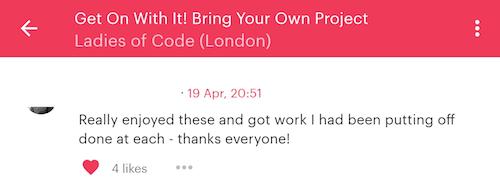
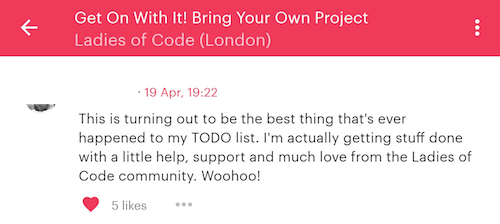
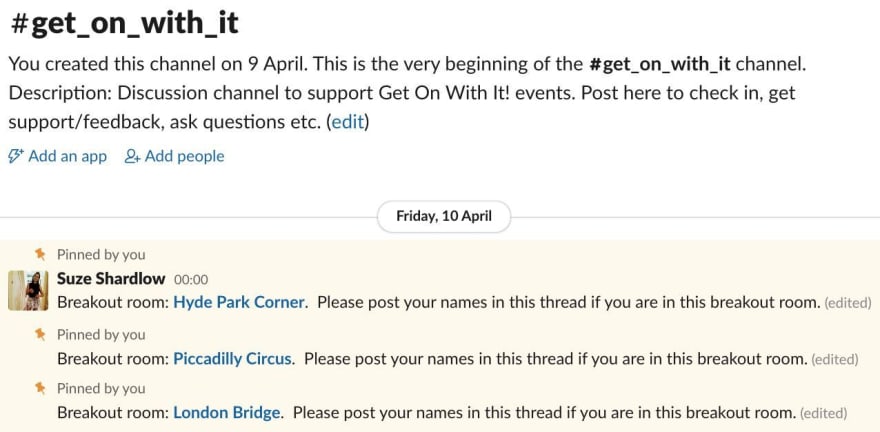
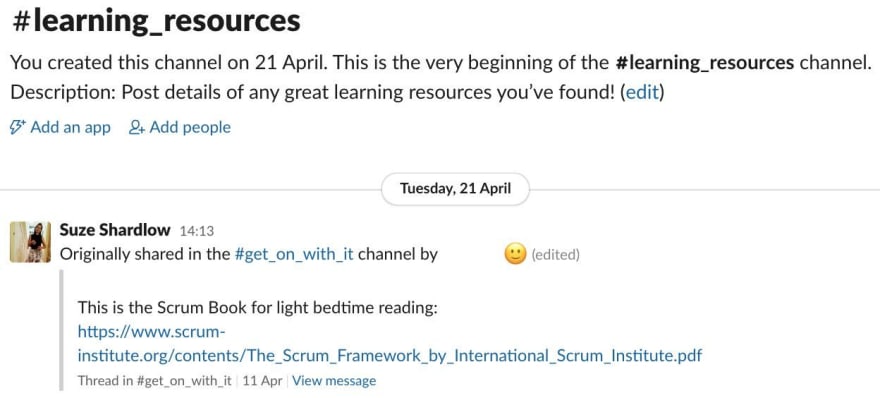



Top comments (0)